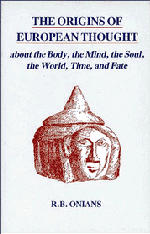Book contents
- Frontmatter
- Contents
- Preface to the first edition
- Preface to the second edition
- Introduction: The Earliest Greeks
- PART I THE MIND AND THE BODY
- PART II THE IMMORTAL SOUL AND THE BODY
- Chapter I The ψυχή
- Chapter II The Genius, Numen, etc.
- Chapter III Anima and Animus
- Chapter IV The Knees
- Chapter V The Strength
- Chapter VI The Stuff of Life
- Chapter VII River-Worship and some Forms of the Life-substance
- Chapter VIII The World: Beginnings of Greek ‘Philosophy’
- Chapter IX Death and Cremation
- Chapter X The Offerings to the Dead and to the Gods
- Chapter XI Nectar and Ambrosia
- PART III FATE AND TIME
- ADDENDA
- Indexes
Chapter II - The Genius, Numen, etc.
Published online by Cambridge University Press: 06 August 2010
- Frontmatter
- Contents
- Preface to the first edition
- Preface to the second edition
- Introduction: The Earliest Greeks
- PART I THE MIND AND THE BODY
- PART II THE IMMORTAL SOUL AND THE BODY
- Chapter I The ψυχή
- Chapter II The Genius, Numen, etc.
- Chapter III Anima and Animus
- Chapter IV The Knees
- Chapter V The Strength
- Chapter VI The Stuff of Life
- Chapter VII River-Worship and some Forms of the Life-substance
- Chapter VIII The World: Beginnings of Greek ‘Philosophy’
- Chapter IX Death and Cremation
- Chapter X The Offerings to the Dead and to the Gods
- Chapter XI Nectar and Ambrosia
- PART III FATE AND TIME
- ADDENDA
- Indexes
Summary
We have seen the parallelism between the Roman conception of cor, praecordia, etc., and the Greek conception of κῆρ, ϕρένες, etc. For both peoples the seat of consciousness was in the chest. What was the Roman view of the head, caput, whose importance appears so strikingly in legal and other phrases? It has been generally recognised—indeed is obvious—that it was used as loosely equivalent to ‘life’. Why has not been explained. The figure pars pro toto and the fatal results of decapitation have perhaps sufficed. I suggest, what does not appear to have been suspected, that it was thought to contain the seed, the very stuff of life, and the life-soul associated with it. This seems to be the explanation of the early phrase, caput limare cum aliqua (or aliquo), ‘to diminish (lit. “file away”, cf. molere, terere) one's head with someone’, which has been taken to mean ‘to kiss’. One might speak of ‘snatching kisses from’ someone but it would be strange to speak of kissing as ‘filing away one's head’ with the help of somebody. It is not a jest but an indirect way of referring to some quite important act. Thus a character in a tragedy of Livius Andronicus says: ‘Believe it that she never with my will diminished her head with him’.
- Type
- Chapter
- Information
- The Origins of European ThoughtAbout the Body, the Mind, the Soul, the World, Time and Fate, pp. 123 - 167Publisher: Cambridge University PressPrint publication year: 1988

